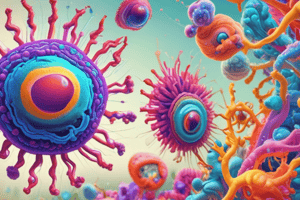Podcast
Questions and Answers
What is the main focus of genetics?
What is the main focus of genetics?
- Evolutionary development
- Molecular basis of inherited traits (correct)
- Ecological interactions
- Study of cells
Which type of cells are found in bacteria?
Which type of cells are found in bacteria?
- Fungal cells
- Prokaryotic cells (correct)
- Eukaryotic cells
- Plant cells
What is the basic unit of life in biology?
What is the basic unit of life in biology?
- Genes
- Organs
- Cells (correct)
- Tissues
Which organisms have eukaryotic cells?
Which organisms have eukaryotic cells?
What is the smallest structural unit of an organism that can exist independently?
What is the smallest structural unit of an organism that can exist independently?
In which organisms are eukaryotic cells further divided into plant cells and animal cells?
In which organisms are eukaryotic cells further divided into plant cells and animal cells?
What is the main focus of ecology?
What is the main focus of ecology?
Which field of biology is crucial for understanding how ecosystems function?
Which field of biology is crucial for understanding how ecosystems function?
What is evolution in biology primarily associated with?
What is evolution in biology primarily associated with?
Which area of study focuses on the structure and function of biological macromolecules?
Which area of study focuses on the structure and function of biological macromolecules?
What does biochemistry study that can be altered or disrupted by genetic mutations or environmental factors?
What does biochemistry study that can be altered or disrupted by genetic mutations or environmental factors?
Which field of biology helps us understand how human activities can impact the environment?
Which field of biology helps us understand how human activities can impact the environment?
What does evolution help us understand about the biosphere?
What does evolution help us understand about the biosphere?
Which field provides valuable insights into the structure, function, and interaction of living organisms?
Which field provides valuable insights into the structure, function, and interaction of living organisms?
What is the primary focus of biochemistry?
What is the primary focus of biochemistry?
Which field of biology is fundamental in understanding how cells carry out their functions?
Which field of biology is fundamental in understanding how cells carry out their functions?
Flashcards are hidden until you start studying
Study Notes
Introduction
Biology is the science of life and living organisms, their structure, function, growth, evolution, development, and interaction with each other and the environment. It encompasses a vast range of topics, including cells, genetics, ecology, evolution, and biochemistry. In this article, we will explore the different subtopics of biology, their relevance, and their impact on our understanding of life.
Cells
Cells are the basic unit of life, and understanding them is crucial in biology. A cell is the smallest structural, functional, and biological unit of an organism that can exist independently. Cells can be classified into two main types: prokaryotic cells, which are found in bacteria, and eukaryotic cells, which are found in plants, animals, fungi, and protists. Eukaryotic cells are further divided into plant cells and animal cells, which share some similar structures but also have distinct differences.
Genetics
Genetics is the study of heredity and variation of organisms. It focuses on the molecular basis of inherited traits and the changes in genetic material that occur during an organism's life. Genetics has played a significant role in understanding how traits are passed down from parents to offspring and how mutations can lead to genetic disorders.
Ecology
Ecology is the branch of biology that deals with the interactions among organisms and their environment. It studies the relationships between living organisms, their physical environment, and the interactions among those organisms. Ecology is crucial for understanding how ecosystems function, how species interact, and how human activities can impact the environment.
Evolution
Evolution is the process by which species change over time through natural selection and other mechanisms. It is a fundamental concept in biology that helps us understand the diversity of life on Earth. Evolution has been observed in various types of organisms, from bacteria to humans, and has played a significant role in shaping the biosphere.
Biochemistry
Biochemistry is the study of chemical processes within and related to living organisms. It focuses on the structure, function, and mechanisms of biological macromolecules such as proteins, nucleic acids, and carbohydrates. Biochemistry is essential for understanding how cells carry out their functions and how these functions can be altered or disrupted by genetic mutations or environmental factors.
Conclusion
Biology is a vast and interconnected field that encompasses a wide range of subtopics. Each of these subtopics provides valuable insights into the structure, function, and interaction of living organisms. By studying biology, we not only gain a deeper understanding of life but also develop the knowledge and skills necessary to address pressing issues related to human health, environmental sustainability, and biotechnology.
Studying That Suits You
Use AI to generate personalized quizzes and flashcards to suit your learning preferences.




